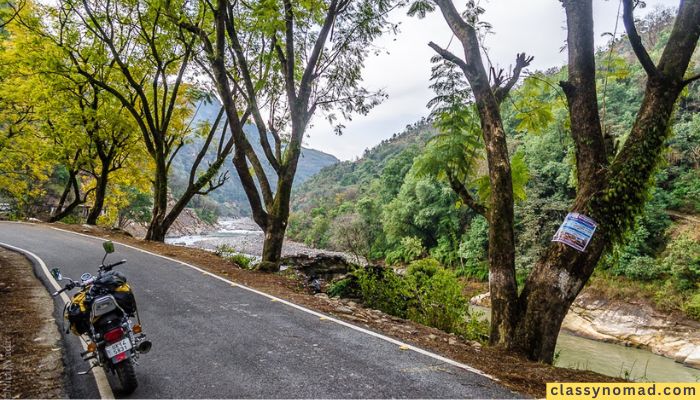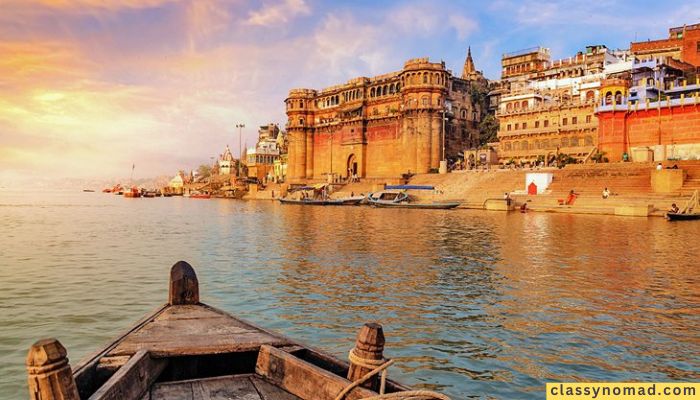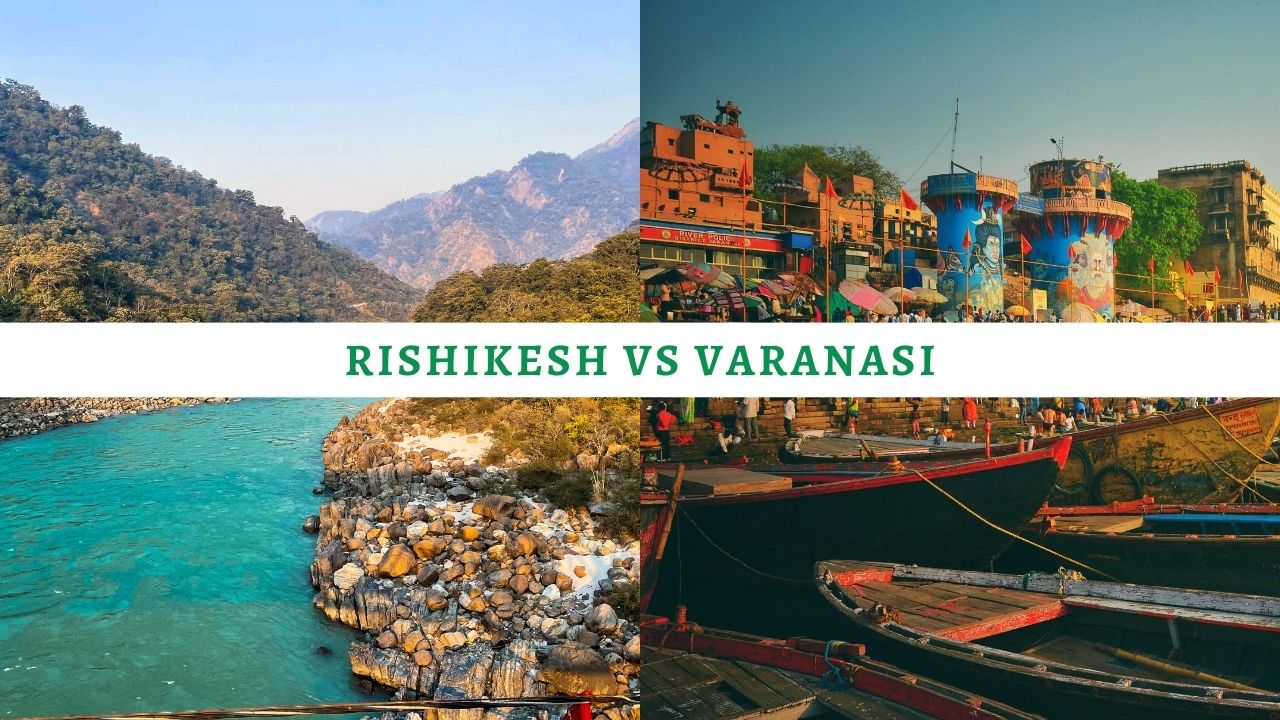Rishikesh vs Varanasi; where should you visit? If this is your question, you have come to the right place. Here, I’ll explore these two iconic tourist sites from various angles to help you make the right choice.
Northern India is a treasure trove of cultural heritage and spirituality, with Rishikesh and Varanasi standing out as two prominent destinations that attract countless travelers from around the world.
Rishikesh, nestled in the foothills of the Himalayas, and Varanasi, situated on the banks of the sacred River Ganges, offer unique experiences that showcase the rich tapestry of Indian traditions.
In this article, we will delve into a detailed comparison of these two remarkable cities, covering various aspects such as location, accessibility, historical significance, natural beauty, adventure activities, accommodation options, the best time to visit, ideal trip duration, average budget, etc.
Overview: Rishikesh vs Varanasi
Rishikesh and Varanasi, despite being distinct in their ambiance and offerings, share a common thread of spirituality.
While Rishikesh is renowned as the Yoga Capital of the World, attracting yoga enthusiasts and seekers of inner peace, Varanasi is considered one of the oldest living cities, serving as the spiritual heart of India. Both cities offer visitors a glimpse into the spiritual essence of the country, albeit through different lenses.
Location and Accessibility: Rishikesh vs Varanasi
Rishikesh is located in the northern state of Uttarakhand, nestled in the picturesque foothills of the Himalayas. It is easily accessible by road from major cities like Delhi and Dehradun, with a travel time of around 6-7 hours.

Varanasi, on the other hand, is situated in the state of Uttar Pradesh and is well-connected by air, rail, and road. The city has its own airport, the Lal Bahadur Shastri International Airport, which connects it to various domestic and international destinations.
Geographical Comparison: Rishikesh vs Varanasi
Rishikesh, with its pristine setting on the banks of the holy River Ganges and surrounded by lush green mountains, offers a serene and tranquil environment. The city is dotted with numerous ashrams and spiritual retreats.
Varanasi, with its unique riverfront ghats and narrow winding lanes, exudes a distinctive old-world charm. The Ghats of Varanasi, such as Dashashwamedh Ghat and Manikarnika Ghat, are the focal points of religious rituals and ceremonies, creating an otherworldly ambiance.
Historical and Cultural Significance: Rishikesh vs Varanasi
Rishikesh has a rich history dating back to ancient times and is mentioned in several ancient scriptures. It is believed to be the place where Lord Rama performed penance, and it is associated with various legends and mythological stories.
Varanasi, however, holds even deeper historical roots. It is considered one of the oldest continuously inhabited cities in the world and has been a center of learning, art, and culture for thousands of years. It is home to several renowned universities and has been a hub for various art forms, including music, dance, and literature.
Natural Beauty and Scenic Views: Rishikesh vs Varanasi
Rishikesh offers breathtaking natural beauty with its pristine surroundings and the mesmerizing flow of the River Ganges. The city is surrounded by lush forests and offers stunning views of the Himalayan foothills.

Varanasi, with its riverfront location, provides a unique perspective of the Ganges. The early morning boat rides along the river offer a captivating experience as the city wakes up to the sound of prayers and chants.
Adventure and Outdoor Activities: Rishikesh vs Varanasi
Rishikesh is a haven for adventure enthusiasts, offering a plethora of activities such as white water rafting, trekking, camping, and bungee jumping. The mighty Ganges and the rugged terrain of the Himalayas provide an ideal backdrop for these thrilling adventures.
Varanasi, although primarily known for its spiritual significance also offers boat rides along the Ganges and evening aarti ceremonies that create a mesmerizing atmosphere.
Accommodation Options: Rishikesh vs Varanasi
Both Rishikesh and Varanasi offer a wide range of accommodation options catering to different budgets and preferences. Rishikesh has a variety of ashrams, guesthouses, and hotels that provide a peaceful and spiritual ambiance.
Varanasi, being a larger city, offers a broader range of options, including luxury hotels, guesthouses, and homestays.
Food and Cuisine: Rishikesh vs Varanasi
Rishikesh and Varanasi are culinary delights, with their own distinctive flavors and specialties. Rishikesh is known for its sattvic food, which is vegetarian and prepared without onion and garlic. The city offers a wide range of organic and vegan restaurants that cater to health-conscious visitors.

Varanasi, on the other hand, is famous for its street food, especially the mouth-watering chaats and sweets. The lanes of Varanasi are lined with food stalls offering delectable treats like kachoris, lassis, and jalebis.
Nightlife and Entertainment: Rishikesh vs Varanasi
Rishikesh, being a spiritual hub, does not boast a vibrant nightlife scene. However, it offers opportunities for serene evening walks by the riverside and attending peaceful meditation and satsang sessions.
Varanasi, on the other hand, comes alive in the evening with its vibrant ghats, where you can witness the grand aarti ceremonies and listen to soul-stirring classical music performances.
Suggested – Best Places to Visit in Rishikesh at Night
Shopping and Souvenirs: Rishikesh vs Varanasi
Both Rishikesh and Varanasi are shopper’s paradises, offering a wide range of unique handicrafts, textiles, jewelry, and spiritual artifacts. Rishikesh is known for its yoga-related items, including books, clothing, and accessories.
Varanasi, with its rich textile heritage, is famous for its silk sarees and intricate brocades. The bustling markets of Varanasi, such as Vishwanath Gali and Thateri Bazar, are a treasure trove for shoppers.
Tourist Attractions: Rishikesh vs Varanasi
Rishikesh is home to several iconic attractions, including the famous Laxman Jhula and Ram Jhula suspension bridges, which offer panoramic views of the river and surrounding hills. The city also houses numerous ashrams and temples that are of immense spiritual significance.
Varanasi, with its numerous ghats, ancient temples like Kashi Vishwanath Temple, and the historic fort of Ramnagar, offers a plethora of attractions that showcase its rich heritage.
Best Time To Visit: Rishikesh vs Varanasi
The best time to visit Rishikesh is from February to April and September to November when the weather is pleasant for outdoor activities and spiritual practices.
Varanasi, being located in a subtropical climate, is ideal to visit from October to March when the temperatures are relatively cooler.
Ideal Trip Duration: Rishikesh vs Varanasi
For a comprehensive experience, it is recommended to spend at least 3-4 days in Rishikesh to explore its natural beauty, indulge in yoga and meditation, and visit the prominent ashrams.
Varanasi, being a larger city with numerous attractions, warrants a longer stay of 4-5 days to fully immerse oneself in its spiritual aura and explore its historical and cultural offerings.
Average Budget: Rishikesh vs Varanasi
Rishikesh offers a range of accommodation options to suit different budgets, with guesthouses and ashrams catering to budget travelers and luxury resorts for those seeking a more indulgent experience.
On average, a moderate budget of around 3000 INR – 3500 INR ($30-$50) per day should suffice for accommodation, meals, and local transportation in Rishikesh.
Varanasi, being a larger city with a wider range of options, offers a similar budget range, although luxury accommodations may be slightly higher.
Getting Around: Rishikesh vs Varanasi
In Rishikesh, most attractions are easily accessible on foot, and auto-rickshaws and taxis are readily available for longer distances.
Varanasi has a well-established transportation system, with cycle rickshaws, auto-rickshaws, and taxis being the main modes of getting around the city. Boat rides along the Ganges are also a popular way to explore the city.
Conclusion – Rishikesh vs Varanasi
Rishikesh and Varanasi, two gems of Northern India, offer distinct yet captivating experiences to travelers. Rishikesh beckons with its serene natural beauty, spiritual ambiance, and adventure activities, while Varanasi enthralls with its ancient heritage, spiritual rituals, and vibrant culture.
Whether seeking tranquility, spiritual enlightenment, or a cultural extravaganza, these cities have something unique to offer, making them must-visit destinations for any traveler in search of the essence of India.
FAQs – Rishikesh vs Varanasi
1. Can I practice yoga in Varanasi like in Rishikesh?
While Varanasi is not as renowned as Rishikesh for yoga, it does offer yoga classes and retreats conducted by various schools and ashrams. However, Rishikesh remains the primary destination for yoga enthusiasts.
2. Is it safe to travel alone as a solo female traveler in Rishikesh and Varanasi?
Rishikesh and Varanasi are generally safe destinations for solo female travelers. However, it is advisable to take usual precautions, such as avoiding isolated areas at night and being mindful of your surroundings.
3. Are there any specific clothing requirements while visiting Rishikesh and Varanasi?
Both cities have a spiritual and traditional ethos, and it is recommended to dress modestly, especially while visiting temples and ashrams. Wearing conservative clothing that covers the shoulders and knees is considered respectful.
4. Can I witness a cremation ceremony in Varanasi?
Yes, Varanasi is known for its cremation ghats, especially the Manikarnika Ghat, where cremations take place round the clock. However, it is essential to approach such ceremonies with respect and sensitivity.
5. Are there any precautions to take regarding water and food safety?
It is advisable to drink bottled or filtered water and eat at hygienic establishments to avoid any potential health issues. Being cautious about street food and ensuring its freshness is recommended.

